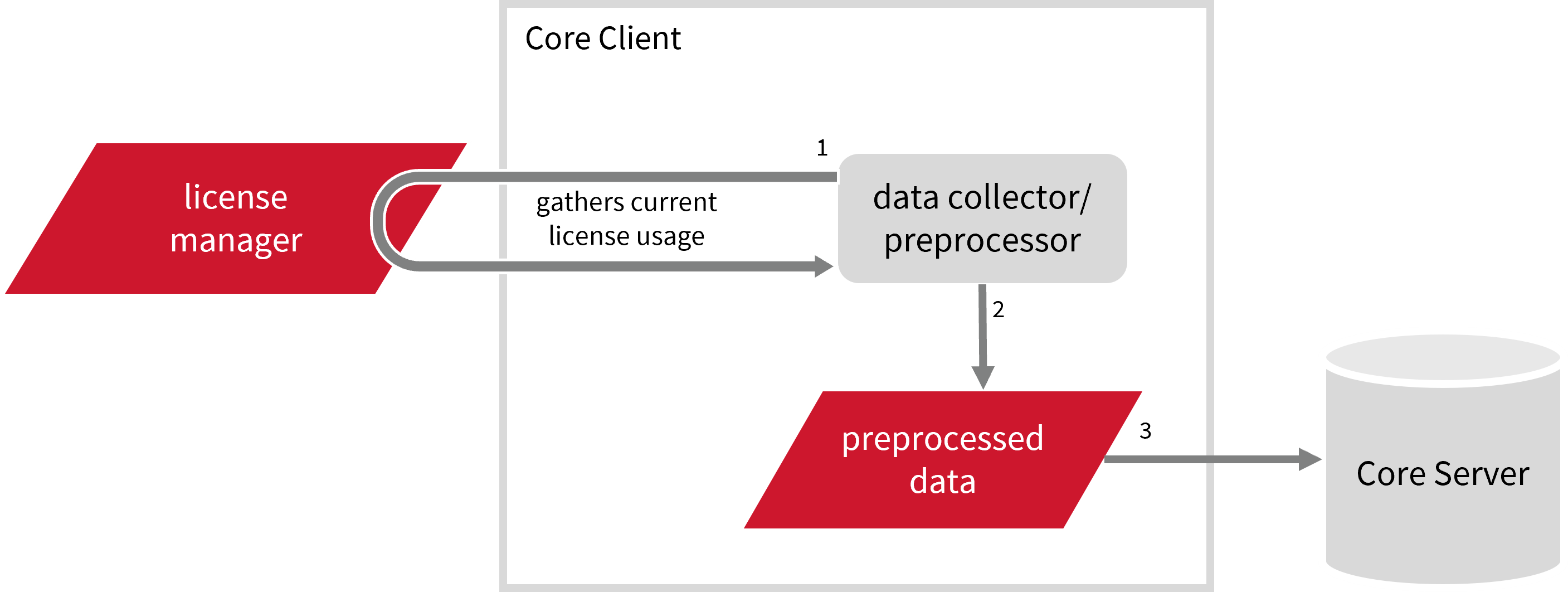We’re upgrading your documentation experience!
A new doc website is live at docs.openit.cloud — a temporary preview during our transition. This website is now in maintenance-only mode (only critical issues will be addressed).
Explore the new website and send us your feedback!
#
SimpleFlex License Manager
Recommended reading: Flex vs SimpleFlex
#
Introduction
Open iT supports SimpleFlex usage reporting by polling the license servers at regular intervals to get the current status of its license use and availability.
An Open iT client is installed on your license server for this collection. The data collector/preprocessor gathers the current license usage information from the license manager every hour using a 5-minute sample interval, triggering the data collection process. It also processes the gathered license usage. Once the data is preprocessed, it is transmitted to the Core Server, according to the client's timezone, for further storage, completing the license usage data collection and processing.

This will produce the following aggregated data types used for historical reporting:
- (49) Host User License Use
- (93) OLAP Raw Hourly
- (94) OLAP User Concurrency
- (95) Usergroup License Use v3.0
- (102) OLAP Total Use
The following sections will guide you in setting up the necessary configuration to collect and send the required data to the server.
Apply the configurations shown in the Open iT client.
#
Requirements
- An Open iT Client connected to an Open iT Server or a coexistent Open iT setup
- Activated LicenseAnalyzer collection and license poller
- License server administrative rights
- Running license manager utility binary and its
location
#
Getting the License Status Utility Binary Location
This configuration requires the path to the license status utility binary, lmutil, to obtain the license status information. Get this by following these steps:
#
Through the Interface
- Open the Task Manager.
- Go to the Details tab.
- Locate
lmutil. - Right-click and choose Open file location.
The path of the binary will be displayed.
#
Through the Command Line
Open a command prompt with Administrator level privileges.
Run the following command to locate the binary:
Command Syntaxwhere /r <installation_drive> lmutilwhere
<installation_drive>is the drive where the license manager is installed.Examplewhere /r C:\ lmutilThe path of the binary will be displayed.
After verifying the path of the polling program, make sure that it is running.
Open a command prompt in the directory of the license server executable or the polling program and run the following command:
lmutil lmstatMake sure no errors are encountered.
Run the following command to locate the binary:
find . | grep lmutilThe path of the binary will be displayed.
#
Configuring Data Collection
These are the required steps to activate and configure collection of SimpleFlex usage data.
Go to the Components directory, which is by default in
C:\Program Files\OpeniT\Core\Configuration\Components, and back up thelicpoll.xmlconfiguration file.Open a command prompt with Administrator level privileges.
Go to the bin directory, which is by default in
C:\Program Files\OpeniT\Core\bin, run the command:Command Syntaxcd $BIN_DIRExamplecd C:\Program Files\OpeniT\Core\binOnce in the directory, activate the collection of SimpleFlex data, run the command:
Command Syntaxopenit_confinit -c "licpoll.license-types.simple-flex-sample.active=true"Set the SimpleFlex license file location, run the command:
Command Syntaxopenit_confinit -c "licpoll.license-types.simple-flex-sample.license-file=<simple-flex-license-file>"where
<simple-flex-license-file>is the filename, including the path, of the SimpleFlex license file.Exampleopenit_confinit -c "licpoll.license-types.simple-flex-sample.license-file=C:\Program Files\simpleflex\license.dat"Or set the SimpleFlex license file directory, run the command:
Command Syntaxopenit_confinit -c "licpoll.license-types.simple-flex-sample.license-dir=<simple-flex-license-dir>"where
<simple-flex-license-dir>is the directory containing the SimpleFlex license file.Exampleopenit_confinit -c "licpoll.license-types.simple-flex-sample.license-file=C:\Program Files\simpleflex"Set the path to the binary used by the SimpleFlex License Server, run the command:
Command Syntaxopenit_confinit -c "licpoll.license-types.simple-flex-sample.status-command=<binary_path>"where
<binary_path>is the obtained path inGetting the License Status Utility Binary Path .Exampleopenit_confinit -c "licpoll.license-types.simple-flex-sample.status-command=C:\simpleflex\bin\lmutil"Update the configuration file, run the command:
Command Syntaxopenit_confbuilder --clientMake sure no errors are encountered.
Refer to the SimpleFlex Data Collection Configuration table to learn more about SimpleFlex configuration in licpoll.xml.
These instructions assume your configuration directory is /var/opt/openit/etc.
Go to the Components directory, which is by default in
/var/opt/openit/etc/Components, and back up thelicpoll.xmlconfiguration file.Go to the bin directory, which is by default in
/opt/openit/bin, run the command:Command Syntaxcd $BIN_DIRExamplecd /opt/openit/binOnce in the directory, activate the collection of SimpleFlex data, run the command:
Command Syntax./openit_confinit -r /var/opt/openit/ -d /var/opt/openit/etc/ -c "licpoll.license-types.simple-flex-sample.active=true"Set the SimpleFlex license file location, run the command:
Command Syntax./openit_confinit -r /var/opt/openit/ -d /var/opt/openit/etc/ -c "licpoll.license-types.simple-flex-sample.license-file=<simple-flex-license-file>"where
<simple-flex-license-file>is the filename, including the path, of the SimpleFlex license file.Example./openit_confinit -r /var/opt/openit/ -d /var/opt/openit/etc/ -c "licpoll.license-types.simple-flex-sample.license-file=/var/simpleflex/license.dat"Or set the SimpleFlex license file directory, run the command:
Command Syntax./openit_confinit -r /var/opt/openit/ -d /var/opt/openit/etc/ -c "licpoll.license-types.simple-flex-sample.license-dir=<simple-flex-license-dir>"where
<simple-flex-license-dir>is the directory containing the SimpleFlex license file.Example./openit_confinit -r /var/opt/openit/ -d /var/opt/openit/etc/ -c "licpoll.license-types.simple-flex-sample.license-file=/var/simpleflex"Set the path to the binary used by the SimpleFlex License Server, run the command:
Command Syntax./openit_confinit -r /var/opt/openit/ -d /var/opt/openit/etc/ -c "licpoll.license-types.simple-flex-sample.status-command=<binary_path>"where
<binary_path>is the obtained path inGetting the License Status Utility Binary Path .Example./openit_confinit -r /var/opt/openit/ -d /var/opt/openit/etc/ -c "licpoll.license-types.simple-flex-sample.status-command=/var/simpleflex/bin/lmutil"Update the configuration file, run the command:
Command Syntax./openit_confbuilder --clientMake sure no errors are encountered.
Refer to the SimpleFlex Data Collection Configuration table to learn more about SimpleFlex configuration in licpoll.xml.
#
Verifying Data Collection
After configuration, you can verify that the data is collected by following these steps:
Open a command prompt with Administrator level privileges.
Go to the bin directory, which is by default in
C:\Program Files\OpeniT\Core\bin, run the command:Command Syntaxcd $BIN_DIRExamplecd C:\Program Files\OpeniT\Core\binRun the command:
Command Syntaxopenit_licpoll -# 1Verify that the temp directory, which is by default in
C:\ProgramData\OpeniT\Data\temp, contains aLicPolldirectory containing.dataandstatus-*.logfiles.
Go to the bin directory, which is by default in
/opt/openit/bin, run the command:Command Syntaxcd $BIN_DIRExamplecd /opt/openit/binRun the command:
Command Syntax./openit_licpoll -# 1Verify that the temp directory, which is by default in
/var/opt/openit/temp, contains aLicPolldirectory containing.dataandstatus-*.logfiles.
#
Next Steps?
Renaming Vendor License Renaming Features Create and Add Report License Monitor

